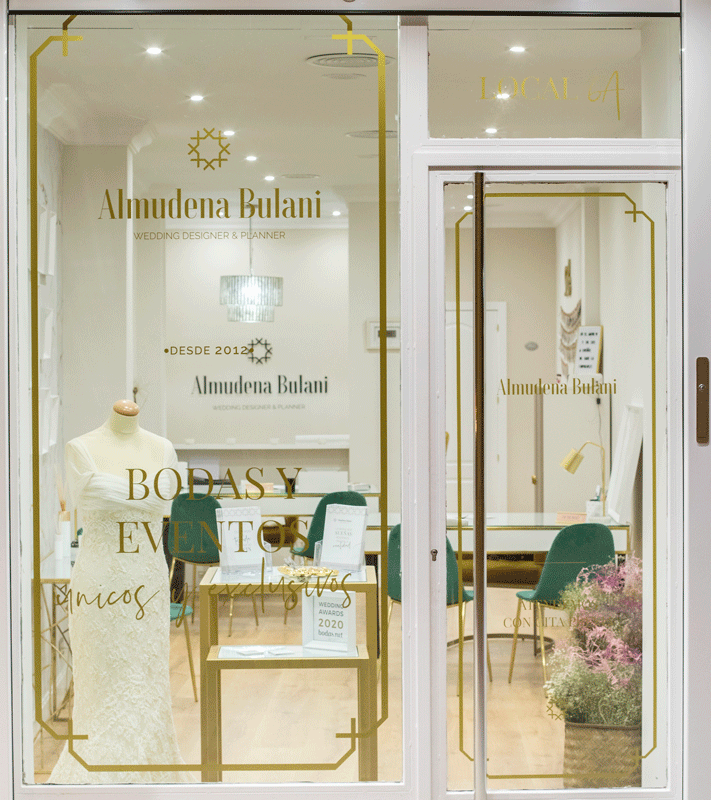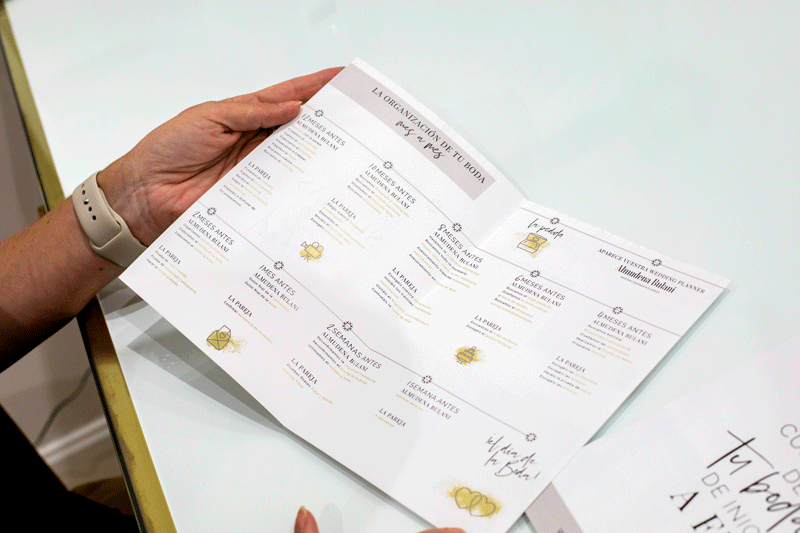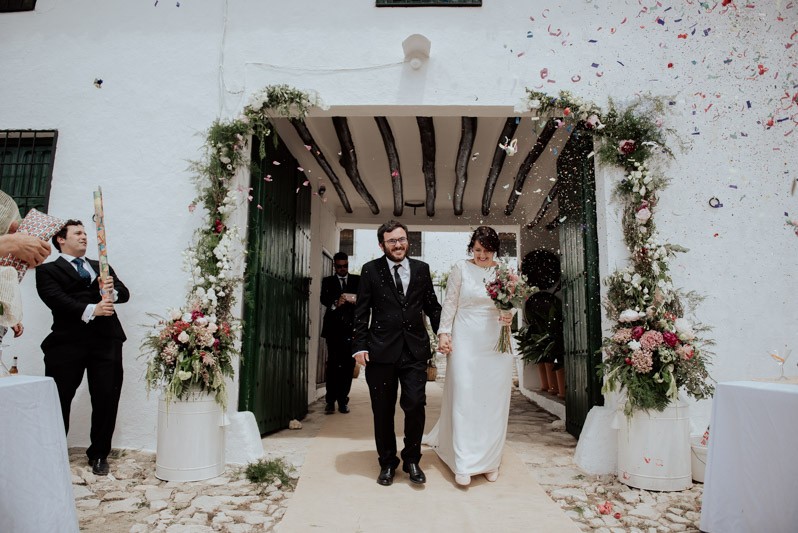Everything you need to know before hiring your wedding planner.
If you are starting to organize your wedding, surely you have felt a certain vertigo when seeing the list of tasks that you have to manage in the coming months. Without many services to organize and as inexperienced in the sector, the best option is usually to hire a wedding planner. For this reason, many couples decide to leave their wedding in the hands of professionals and hire a wedding planner to help them organize their wedding from start to finish.
At Almudena Bulani we have been organizing weddings since 2012, and we know well what are the concerns of a couple who are faced with organizing their wedding for the first time. The illusion and expectations are many, as are the doubts and fears that arise around our professional activity, which is usually unknown to almost all couples who begin to organize their wedding.

Picture: Ruth Giraldez
Many couples make the decision to hire a weding planner due to lack of time; other couples because they want to leave their wedding in the hands of professionals; and others by distance and residing in a different city than the one where they will celebrate their wedding. On many occasions, a mixture of the three previous reasons is what encourages many couples to have the help of a professional wedding designer and planner.
Once the decision is made, the search for the right professional comes and with this search, many questions arise. What services does a Wedding Planner offer? How can he/she help me? And the most common: what does a wedding planner charge?

We answer the most common question before hiring the services of a wedding planner:
What do they charge for their services?
In this post, we are going to explain to you all the methods that a wedding planner has to charge for their services. And the reality in our country is that there is no single method, and that each Wedding Planner charges their services differently. So get out a pencil and paper and take notes.
Work for Free:
You may have laughed, but there are wedding planners who chose this route as the basis of their business. And you may wonder, but what do they live on? Well, it is not for the love of art, they have other ways to enter their fees. And this is through the providers that the bride and groom finally hire.
In this type of management, the wedding planner offers its partners suppliers who offer a commission for client intermediation. That is, for each client that the wedding planner offers you, he/she receives a commission that can be fixed or variable. When it is a variable commission, it usually varies between 5% and 15% of the total. When it is fixed it depends on the total amount.
As professional wedding planners, we advise you not to use this method of work with your future wedding planner and to be wary of any professional who sells you that he/she works for free. The reasons are many:
- Because you start the relationship with your wedding planner on a very negative basis: their work is priceless, but above all, it has no value. Can you demand if you do not pay?
- Because from this base, her search work and supplier proposal will never be objective; It will always be conditioned and she/he will offer you the providers that commission the most.
- The professionalism of the supplier, and that it fits in with your style and budget, will no longer be important. Only how much you pay will be important. They will not be objective before any failure of the provider.
Obviously, there are companies that work with this system, and they make large amounts of money while it works for them. But from our experience they don’t manage to stay open for long. So if you hire a company that works with this format, no one guarantees that it will continue to do so on your wedding date.

Charge a percentage:
This is one of the most common working methods in countries outside our borders. In the US especially and some European countries, this is the fee billing system of most wedding planner companies.
In this system, the wedding planner charges a percentage (usually 10%) of the total budget. For example, in a wedding with a budget of € 30,000, a wedding planner that charges 10% would have a fee of € 3,000
In many cases, the wedding planners that work with this system set a minimum to be paid, especially to avoid being limited by smaller budgets for simpler weddings or fewer guests. In this case, the wedding planner would charge 10% of the total with a minimum of “X amount”. And each wedding planner already sets its minimum fee.
Some disadvantage of this system are:

In Spain it is difficult to understand this system, especially due to a trust problem, in which couples sometimes tend to think that the wedding planner will offer more expensive suppliers to increase the cost of their wedding.
Not enough value is given to our work yet, to understand the link that exists between: greater budget => greater work and dedication => higher fees.
Fixed rate for each of the services:
This method of collecting fees based on the type of service provided (you can see in more detail general services of a wedding planner in the information on our comprehensive wedding service) is a fairly common system in our country.
In this case, the wedding planner decides to value its fees based on the service it offers. That is, the wedding planner service is worth € 1000, the full organization service is worth € 1500 etc….
With this system, other determining factors are not taken into account, such as the number of guests or assistants or the complexity of the wedding itself. A “flat rate” system is chosen where there will be no limitations and a fixed price is paid.
Charge based on the number of guests:
In this system, the premise is that the more guests, the greater the complexity. That is why there are wedding planners who organize their budgets based on the number of attendees.
The most common is that there are sections, that is, weddings of less than 50 guests, 50 to 75 guests etc … Many times, a minimum budget is usually established, which would be the price that a couple would pay, for example organizing an intimate wedding or an elopement.

Charge by the hour:
Everything and that in other professional services this charging system is quite common, in our work it is very difficult to measure the number of hours invested as well as justify them in front of the couple.
Therefore, although it is a possible system, it is not usually at all common as a wedding planner’s payment system.
Make a personalized budget:
This system is the most reasonable, but it has a small drawback, and that is that sometimes, as wedding planners, it is difficult for us to obtain the necessary information to be able to properly budget our work.
Sometimes data as basic as number of guests, date and type of wedding are not provided in a first contact; and this information is essential to be able to make this type of personalized estimates.
The reality is that due to the type of work we do, and the profile of our couples (who have little time to organize a wedding), the first contact is usually via email; an email in which sometimes the basic data is not included.

Combined system:
This system can be a combination of any of the above. For example, a wedding planner that charges more attractive fixed fees and combines them with supplier commissions.
This system is usually quite frequent and its only premise is that the variable part of the commissions should never condition the work of the wedding planner. That is to say, it must offer providers based on the style and budget of the couple, never driven by mere economic remuneration.
Another combined system could be to combine the charging system for attendees based on the specific service contracted. In order to have a broader price escalation based on these variables.
There are also wedding planners that work with pack systems, that is, they have a basic pack, an intermediate pack and a premium pack. Each of them with a different price based on the services that are included.
As you can see, there is a wide range of options that you can find when hiring your future wedding planner.
Our recommendation is that you always have a serious and truly professional company that charges for its professional service, whether in a pack, on a closed budget, for the type of service or the number of guests …
It is important that in addition to the price, you take into account its value: that you feel identified with their work, that you get along with the person themselves, that they give you confidence and that there is a feeling.
Organizing a wedding is a team effort, and you must feel confident and sure of your decision. Sometimes it is worth paying a little more, and choosing that professional who transmits professionalism, closeness, and security to organize your wedding.





